
“EPIC FAILS” The Book Tour! (w/ Ben Thompson)
December 9, 2018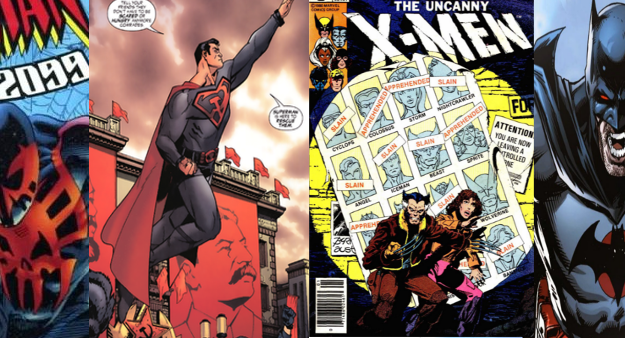
The COMIC ZOMBIE Podcast!
January 29, 2019CONTENT WARNING: the following may contain some mild language, crude humor, alcohol, and commentary on American politics.
Part Nine: FDR, Truman, Eisenhower
About 3 years ago, during the 2016 presidential election, I started a series of articles with the goal of delving into each and every one of the American Presidents in an attempt to show that each has had their share of successes and failures while *attempting to* avoid modern politics… to the best of my ability at least.
In that time, A LOT has happened, both in American politics and my personal life, but most significantly, I had the amazing opportunity to co-write a book series with Ben Thompson! (author of the ‘Badass’ and ‘Guts and Glory’ series) – and it just so happens that our third book is on historical presidents! (EPIC FAILS – Not-So-Great Presidents: Commanders-in-Chief – available to pre-order now on Amazon!) So if you’ve enjoyed this series of articles, please help support me by buying my books!
For right now, this will probably be the last entry in this Presidential Pros and Cons series. As tempting as it is to cover the last 8 presidents (in Parts 11 and 12?), I’ve decided to end it with Nixon… well, at least until modern politics becomes another chapter in history. (2024 Update: the saga continues!)
I’ve learned a lot researching these articles and hope you have too!
Erik Slader
(January 7th, 2019)
35 – JFK: JOHN F. KENNEDY
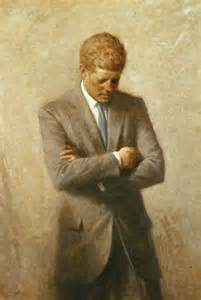 Presidential Years: 1961-1963
Presidential Years: 1961-1963
Political Party: Democrat
Vice President: Lyndon B. Johnson
Ran Against: Richard Nixon (Republican), Harry F. Byrd (Democrat)
First Lady: Jacqueline Lee “Jackie” Kennedy
Quote: “Those who dare to fail miserably can achieve greatly.”
Best known for: JFK Conspiracies and the Cuban Missile Crisis
Random Fact: Had an affair with Marilyn Monroe (allegedly)
Pros:
- Inspiring the nation with the goal of winning the Space Race
- Avoiding all out nuclear war during the Cuban Missile Crisis
- Donated his presidential and congressional salaries to charity
- Was a Naval hero in WWII
- Worked for the Civil Rights cause
- Was critical of the CIA’s shady tactics and the Military Industrial Complex
- Wanted to work towards a path of peace between the US and Soviet Union
- Attempted to deescalate the situation in Vietnam and was intent on pulling American troops from the conflict
Cons:
- The (failed) Bay of Pigs invasion
- Escalating the Cold War
- Mishandling of Congress
- Unfortunately, his “New Frontier” initiative never gained any real traction
Bio: John Fitzgerald Kennedy grew up to a wealthy Irish-Catholic family. His father made his fortune off of selling bootleg liquor during Prohibition. Throughout his childhood, John had numerous medical issues, including Addison’s disease and severe back problems. Some of his symptoms may have even been linked to (un-diagnosed) celiac disease. In school, he was voted “most likely to become President”. Despite his relatively shaky health, Kennedy joined the Navy during WWII and served in the South Pacific in 1943. JFK wasn’t just charming and handsome, he was also a real-life action hero, like a mash-up of James Bond, Captain Kirk, and John McClane.
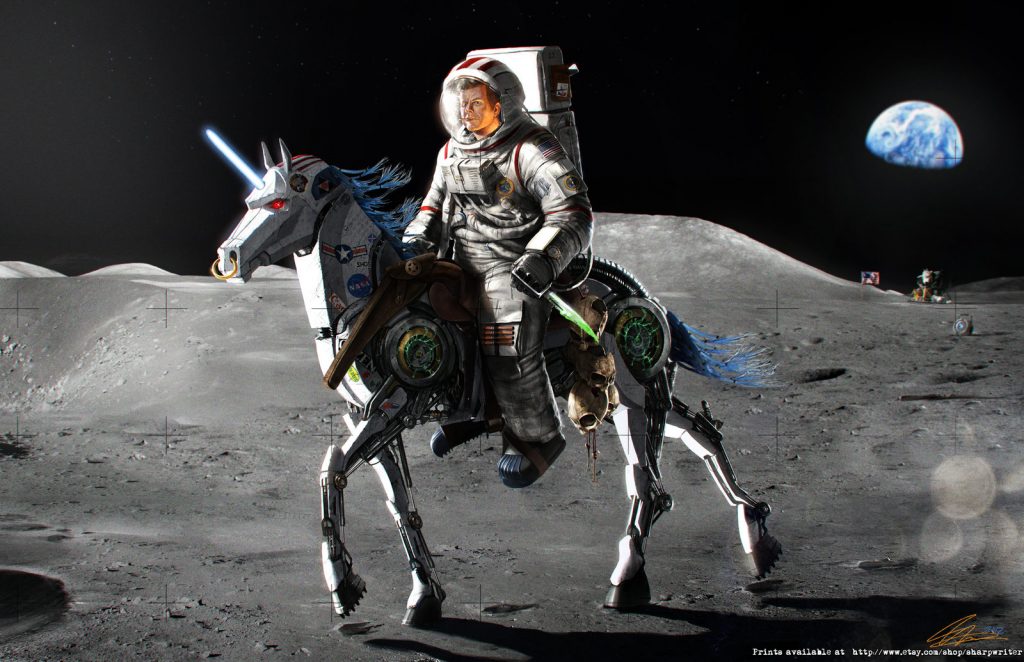
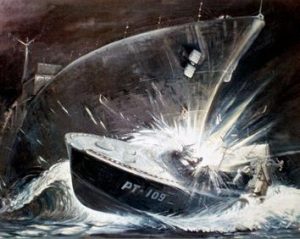 On the night of August 1st, 1943, aboard the PT-109, Lieutenant John F. Kennedy and his crew were alerted to a large Japanese fleet. They moved to intercept the enemy ships through Blackett Strait. The PT-109 and 14 other American boats fired a volley of torpedoes at the Japanese ships, but each one missed their target. During the skirmish, at around 2:27 AM, Kennedy’s ship was rammed by a Japanese destroyer, the Amagiri, cutting it in half! Lt. Kennedy and a dozen other sailors were thrown overboard.
On the night of August 1st, 1943, aboard the PT-109, Lieutenant John F. Kennedy and his crew were alerted to a large Japanese fleet. They moved to intercept the enemy ships through Blackett Strait. The PT-109 and 14 other American boats fired a volley of torpedoes at the Japanese ships, but each one missed their target. During the skirmish, at around 2:27 AM, Kennedy’s ship was rammed by a Japanese destroyer, the Amagiri, cutting it in half! Lt. Kennedy and a dozen other sailors were thrown overboard.
As the PT-109 began to sink into a sea of flame, Kennedy bravely swam through the oily waters and managed to rescue three survivors. The eleven men clung desperately to the side of the half submerged torpedo boat for the next 12 hours! After drifting south, they decided to make a swim for it. Using timber from one of the gun mounts, they swam 3.5 miles through shark-infested waters to a small deserted island. JFK literally pulled one of the injured survivors along with a strap held in his teeth, while he spent the next 4 hours swimming and pushing the floating debris with their supplies toward land!
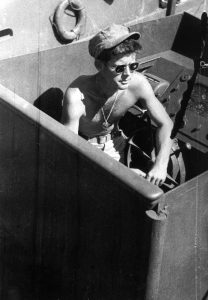
Young Lt. Kennedy
When they were deciding whether or not to surrender, Kennedy told his men, “There’s nothing in the book about a situation like this. A lot of you men have families and some of you have children. What do you want to do? I have nothing to lose.” They spent the next week stranded in the middle of the Pacific Ocean. At one point, Kennedy made an hour long swim to Naru Island in search of food and possible rescue. It was there he found a small canoe, a 50-gallon drum of fresh water, a few packs of crackers and some candy. On August 8th, Kennedy and his crew were finally rescued. JFK returned home to numerous medals and acclaim.
Despite Kennedy’s heroics, the mission had been a complete failure. Captain Robert Bulkley later commented, “This was perhaps the most confused and least effectively executed action the PTs had been in. Eight PTs fired 30 torpedoes. The only confirmed results were the loss of PT 109 and damage to the Japanese destroyer Amagiri”.
After returning home to Massachusetts, JFK decided to try his hand at politics. He first served in the House of Representatives and then later in the Senate. At one point he fell critically ill and even received Catholic last rights. During this time he wrote “Profiles in Courage”, a book about Senators who had risked their careers for their personal beliefs and principles, which earned him a Pulitzer Prize in 1957!
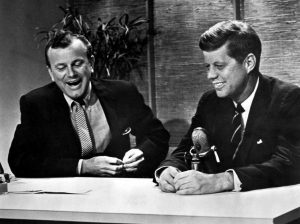
Senator Kennedy on the Tonight Show, 1959
In 1960, JFK announced his intention to run as the Democratic candidate for the Presidency. After accepting the nomination, Kennedy gave one of his most moving speeches: “We stand today on the edge of a New Frontier—the frontier of the 1960’s, the frontier of unknown opportunities and perils, the frontier of unfilled hopes and unfilled threats. … Beyond that frontier are uncharted areas of science and space, unsolved problems of peace and war, unconquered problems of ignorance and prejudice, unanswered questions of poverty and surplus…”
It may seem like a strange notion today, but the fact that Kennedy was Catholic was somewhat controversial and was a major challenge he had to overcome with the public, but he assured everyone, in his own words: “I am not the Catholic candidate for president. I am the Democratic Party candidate for president who also happens to be a Catholic. I do not speak for my Church on public matters – and the Church does not speak for me.”
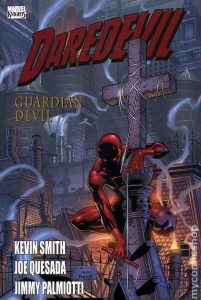
Kinda like the masked vigilante known as Daredevil…
During the campaign, JFK appeared in the first ever televised presidential debate against Richard Nixon, the Republican nominee and VP to President Eisenhower. During the debate, Nixon looked like crap. He was sweating, limped on an injured leg, and was sporting 5’o clock shadow. In stark contrast, Kennedy was energetic, charismatic and collected. Viewers across the nation felt that Kennedy had easily won, but listeners over the radio were pretty evenly divided.
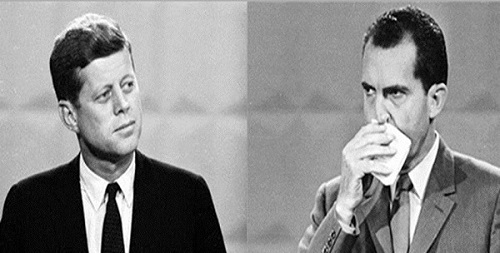
JFK vs Nixon
Kennedy narrowly beat out Nixon during one of the nation’s closest presidential elections, with just two/tenths of one percent: 49.7% to 49.5%! At noon on January 20th, 1961, John F. Kennedy was sworn in as the 35th President of the United States. In his inauguration address, Kennedy rallied the nation to think forward and come together, “My fellow Americans, ask not what your country can do for you, ask what you can do for your country.”
During his far too short Presidency, JFK had to contend with far more than most Presidents that came before and after. The Cold War was quickly heating up, the country was divided, and the Civil Rights movement was at a critical point. Communism was spreading around the world and racial violence was erupting around the country. Kennedy had a number of epic failures happen on his watch, most notably the failed ‘Bay of Pigs’ Invasion of Cuba, but he ultimately made up for it, with his calm-headed handling of the Cuban Missile Crisis that followed, when the world came closer than ever before to a full-scale nuclear war… (More on all that here!)
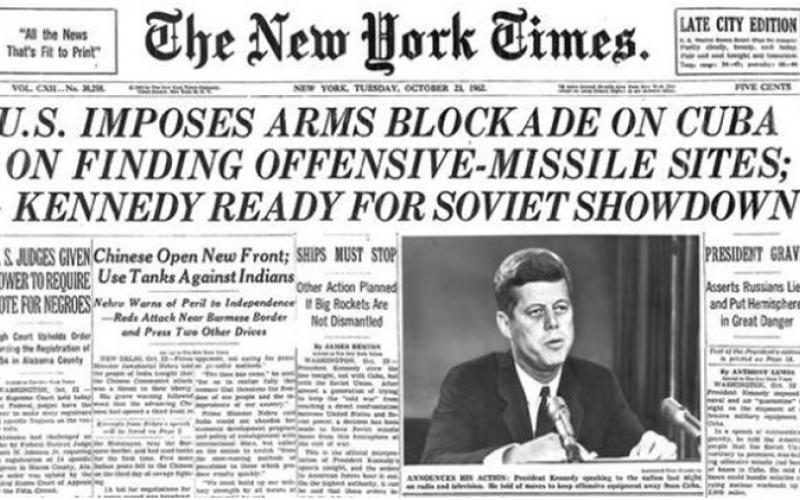
President Kennedy was far from perfect, he was a somewhat notorious womanizer and wasn’t the most effective politician when it came to working with Congress, but he was also a loving father to three children, gave most of his money to charity, and is considered one of the most inspiring leaders of the 20th century. Kennedy worked to end segregation and helped to ignite America’s space program by giving NASA a goal of reaching the moon by the end of the decade! (Read more in “Epic Fails: The Race to Space”!)
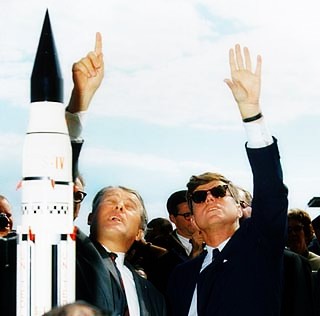 Unfortunately, John F. Kennedy would never see that day come in his lifetime, because on Friday, November 22nd, 1963 (11/22/63), Kennedy was assassinated in Dallas, Texas, by Lee Harvey Oswald (at least according to the “official narrative”). Oswald claimed he was a patsy and was killed two days later by Jack Ruby, before he could be convicted. Kennedy’s VP, Lyndon B. Johnson succeeded him and launched an investigation with the Warren Commission.
Unfortunately, John F. Kennedy would never see that day come in his lifetime, because on Friday, November 22nd, 1963 (11/22/63), Kennedy was assassinated in Dallas, Texas, by Lee Harvey Oswald (at least according to the “official narrative”). Oswald claimed he was a patsy and was killed two days later by Jack Ruby, before he could be convicted. Kennedy’s VP, Lyndon B. Johnson succeeded him and launched an investigation with the Warren Commission.
It’s worth pointing out however that prior to the assassination, a few very interesting things happened: JFK fired Allen Dulles, the head of the CIA and threatened to “shatter the CIA into a thousand pieces and scatter it to the winds”, wanted to pull American troops out of Vietnam, and was even considering peace talks with the Soviet Union to end the Cold War, with a plan to collaborate on a mission to the moon! Somewhat suspiciously, LBJ reversed course on Vietnam immediately after JFK’s death, and even appointed Allen Dulles as the head of the Warren Commission! The findings of the Warren Commission have since been under a lot of scrutiny by both government officials and the public.
There are (of course) a number of “outlandish” conspiracy theories surrounding Kennedy’s assassination, ranging from grassy knoll shooters to connections with the Italian mafia, Soviet spies, and rogue elements within the CIA, but the true story was probably far less exciting. According to Bonar Menninger’s book, “Mortal Error”, JFK wasn’t actually killed by the full-metal-jacket bullets fired by Oswald, but instead by an accidental misfire from a secret service agent’s rifle in the motorcade! Which honestly, if you think about it, would explain a few suspicious details.
As of this time, the JFK files still haven’t been fully declassified, so we may never know.
2023 Updates regarding the JFK Assassination:
Several new stories have come out since I first wrote this article (right around the 60th anniversary of that fateful day), and while “the truth” is still up in the air, there are now plenty of reasons to suspect that the “official narrative” is most likely false. After looking into this further, I’m fairly certain that (at the very least) Oswald didn’t act alone, and may have actually been a patsy. However, if you want to dig into this further, here are some sources worth looking into:
- “Who Killed JFK?” – A 10-Part Podcast Series by Rob Reiner and Soledad O’Brien (2023) – An in-depth audio documentary series that lays down a pretty convincing case for why Oswald wasn’t the shooter (eyewitnesses saw him on the second floor of the Book Depository, eating lunch moments before the incident), and who may have been behind it, and why.
- “JFK: What the Doctors Saw” (Paramount Plus, 2023) – A disturbing documentary with recently released interviews from the Parkland Doctors who tried to save his life, who all claim that the shots came from the front.
- New name emerges in JFK assassination investigation (ABC Chicago News – You Tube, 2023) – New evidence released by the Federal Government regarding a top-secret CIA operation involving an investigation into Lee Harvey Oswald *prior* to the assassination, however 4,684 documents remain classified to this day for reasons of “National Security”.
- Why the ‘single bullet theory’ in JFK assassination is impossible (Arizona News – You Tube, 2023) – Forensic analysts use computer simulations to prove that the so-called “Magic Bullet Theory” is physically impossible.
- “JFK REVISITED: Through the Looking Glass” (2021) – Oliver Stone documentary that sheds light on the events that led up to and the investigation that followed the assassination, with new compelling evidence that seemingly discredits the findings of the Warren Commission…
- “The Final Witness” by Paul Landis (2023) – A book by one of Kennedy’s own Secret Service Agents that raises new questions about the case, regarding the so-called “Magic Bullet” that was found inside the limo…
- TIME Magazine: “What We Know and Still Don’t Know About the JFK Assassination” (2023)

36 – LYNDON B. JOHNSON
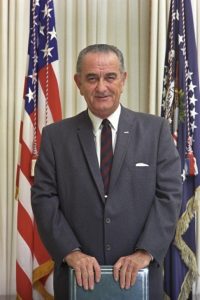 Presidential Years: 1963-1969
Presidential Years: 1963-1969
Political Party: Democrat
Vice President: Vacant / Hubert Humphrey
Ran Against: Barry M. Goldwater (Republican)
First Lady: Lady Bird Johnson
Quote: “Yesterday is not ours to recover, but tomorrow is ours to win or lose.“
Best known for: Vietnam / The Gulf of Tonkin Incident
Random Fact: Married his wife with a $2.50 wedding ring from Sears!?
Pros:
- Massive social reforms and a crucial boost to the Civil Rights movement
- The Civil Rights Act of 1964
- The Voting Rights Act of 1965
- The Social Security Amendments of 1965 (Medicaid / Medicare)
- Put the country before himself
- Attempted to unite the nation as a “President of the people”
Cons:
- The Tonkin Gulf Resolution
- Prolonging the conflict in Vietnam
- Intentionally misinforming the public
- Mishandled the Warren Commission by appointing the former head of the CIA to investigate the assassination of JFK…
Bio: Lyndon B. Johnson was… an interesting guy to say the least. LBJ was born in 1908 in a small Texas town. He grew up in relative poverty on a ranch. One of his first jobs was as a teacher at a Mexican-American school, which helped shape his views on race relations, in a positive light, and helped him sympathize with the downtrodden.
Johnson had an insatiable lust for power, but he was also really good with people. He was an incredibly talented politician. He served in the House of Representatives, and became a Texas State Senator, before serving as JFK’s Vice President. Then, tragedy struck when Kennedy’s assassination shocked the nation. Lyndon B. Johnson stepped up to plate and took up the immense challenges that JFK had left behind and began healing a nation in mourning.
One of President Johnson’s biggest accomplishments was the Civil Rights Act of 1964, which (unlike a lot of the legislation before) actually made a difference in officially ending segregation and the Voting Rights Act of 1965, which *finally* gave equal rights to African Americans. It was the first bold step towards a brighter future for all.
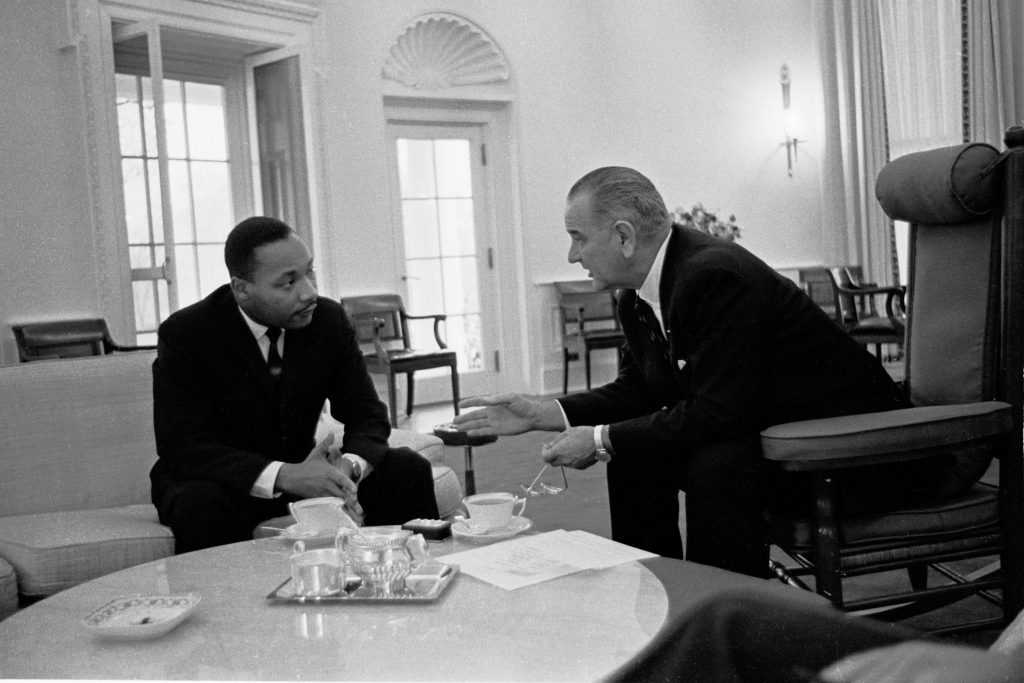
LBJ meets with Dr. Martin Luther King Jr.!
On the other hand, one of the LBJ’s biggest failures would have to be his mis-handling of the situation in Vietnam. Before his untimely death, President Kennedy had ordered troops to be withdrawn from Vietnam, but upon ascending to the office, Lyndon Johnson decided to reverse that decision.
After the Second Gulf of Tonkin Incident, in which an American patrol ship raised a false alarm caused by phantom radar pings, President Johnson decided to keep the real story under wraps and decided to use the non-incident as an excuse to get the United States involved by intentionally misleading the public. (Hear more about this and other ‘Dumb Moments from History’ on the podcast!)

So for all his victories on the home front, LBJ also contributed to America’s involvement in perhaps the most unpopular war in the country’s history. (cue “Flight of the Valkyries”)
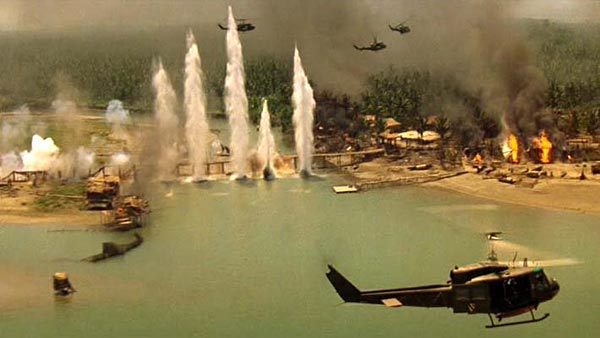
“Apocalypse Now” (1979)
37 – RICHARD NIXON
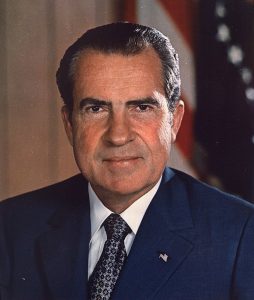 Presidential Years: 1969-1974
Presidential Years: 1969-1974
Political Party: Republican
Vice President: Spiro Agnew (Resigned, 2nd term) / Gerald Ford
Ran Against: Hubert Humphrey (Democrat), George C. Wallace (American Independent) / George McGovern (2nd term)
First Lady: Pat Nixon
Quote: “When the President does it, that means that it is not illegal.“
Best known for: The Watergate scandal.
Random Fact: Had a weird (unsettling) habit of eating cottage cheese with ketchup…
Pros:
- Created the EPA (Environmental Protection Agency)
- Ended the draft
- Started the war on cancer
- Decimated 70% of the national deficit
- The 26th Amendment: lowering the age to vote
- Affirmative action
- Worked to desegregate schools in the south
- Opened up trade with China
- Eventually initiated peace talks with North Vietnam
- Apollo 11
Cons:
- Watergate
- Lied under oath
- Committed Obstruction of Justice
- Illegal wiretapping of government buildings without court authorization
- Extremely corrupt, involved in dirty politics
- Had ties to the mafia?
- Was kinda racist, probably sexist and definitely Anti-Semitic
- Was extremely paranoid
- Was involved in the McCarthy Trials
- Pouring billions into the creation of the DEA and the (failed) War on Drugs
- Orchestrated a violent coup in Chile with the CIA
- The Bombing of Cambodia
- Invaded Grenada
- Needlessly extending the conflict in Vietnam
- Sabotaged the Paris Peace talks over Vietnam
- Persecuted anti-war protesters
- Instituted wage and price controls
- The 1973 Oil Crisis
- One of the most authoritarian Presidents we’ve ever had
- Nearly impeached, but resigned and was then pardoned for his numerous crimes
Bio: Richard Nixon is often considered one of the worst presidents in history, but after researching ALL of the Presidents, I’d actually argue that he’s closer to the bottom five. For my money, Andrew Johnson, James Buchanan, Andrew Jackson, and Warren G. Harding were all slightly worse for various reasons. Nixon’s presidency is often judged by how it ended (with the Watergate scandal), but his achievements are often overlooked because of his many, many scandals, cover ups, conspiracies and numerous crimes. That’s not to say I’m completely letting him off the hook, because holy crap, this guy was crooked.
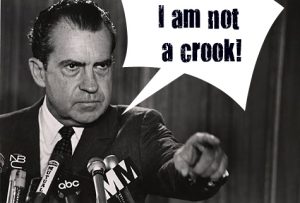
Richard Milhous Nixon (or ‘Tricky Dick’ as his “friends” called him?) came from a family of Lemon farmers, served in the Navy during WWII, got into politics by answering a political ad, later became a member of the House of Representatives, then a Senator from California, and was Eisenhower’s Vice President. After losing the 1960 Presidential Election against JFK, Nixon decided to try again in 1968. Senator Robert F. Kennedy had just been assassinated and President Johnson had decided not to run for reelection, leaving LBJ’s Vice President, Hubert Humphrey as his only real competition.
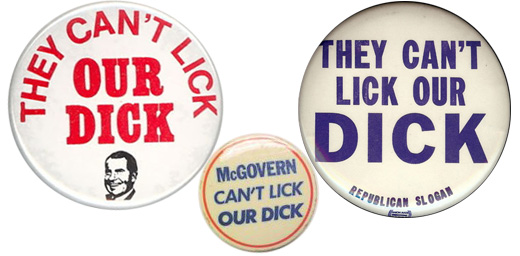
Nixon figured he had a chance with the Democrats so divided over the turmoil in Vietnam. He ran on a campaign to end the Vietnam War and bring stability back to a country in chaos. Nixon defeated Humphrey by seven-tenths of a percent, just 500,000 votes according to the popular vote, but easily wiped the board with the electoral college: 301 electoral votes (Nixon) to 191 (Humphrey), with 46 for some random guy named George C. Wallace.
Despite running on a campaign of ending the war in Vietnam, he actually prolonged it… by another 4 years! In the Election of 1972, Vietnam was still in full swing, to the point that his opponent, George McGovern also ran on a campaign of (finally) getting out of Vietnam. What’s more, in 2008, LBJ’s personal recordings were declassified and it was revealed that Johnson personally witnessed Richard Nixon intentionally sabotaging the Vietnam Peace talks in Paris, back in 1968!

Before I really dip into Nixon’s deep well of scumbagery, I figured I’d mention some of the more positive things he actually did while in office, because believe it or not, he actually accomplished a lot!
You see, Nixon opened up trade with China, smoothed things over with the Soviet Union, ended the draft, swept away 70% (!) of the national debt, lowered the voting age, desegregated the schools in the south and established the National Cancer Act in 1971. Oddly enough, Nixon and the Republican party also attempted to create an Affordable Healthcare Act, very similar to the one that Obama would later rally for, to the disapproval of Republicans. Another surprising plot-twist: Nixon established the EPA! That’s right, the Environmental Protection Agency itself wouldn’t be a thing without Richard Nixon.
Let that sink in, I’ll wait.
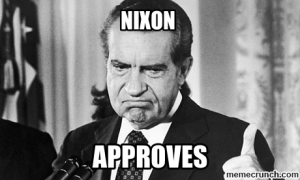
Unfortunately though, Nixon’s ego and paranoia would be his undoing. It all started with a break in at the DNC headquarters at the Watergate Office Complex on June 17th, 1972. Five arrests were made in the attempted burglary. Bob Woodward and Carl Bernstein, reporters for The Washington Post, decided to investigate the incident which eventually led them to uncovering a vast conspiracy that led to the President himself! Together, they came into contact with an anonymous informant under the alias “Deep Throat”, which was later revealed to be Special Agent Mark Felt of the FBI.
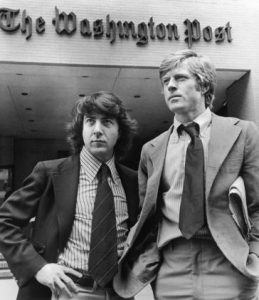
“All the President’s Men” (1976)
The investigation led to a money trail which revealed a shocking connection between the burglars and the Nixon administration. Officials in Nixon’s inner circle were attempting to rig the election by getting information on the Democrats by wiretapping their phones, like something out of a spy movie. It was then revealed that Nixon had recorded hundreds of hours of conversations during his presidency.
Not long after, on April 30th, 1973, top White House staffers, John Ehrlichman and H.R. Haldeman as well as Attorney General Richard Kleindienst resigned over the scandal, while Nixon’s counsel, John Dean was fired and a special prosecutor was appointed to the Watergate investigation: Archibald Cox.
During the investigation, Nixon refused to turn over the tapes, instead turning over transcripts and citing ‘executive privilege’. Later, when he was pressured to turn over the tapes, it was revealed that 18 and a half minutes had gone missing, not suspicious at all.
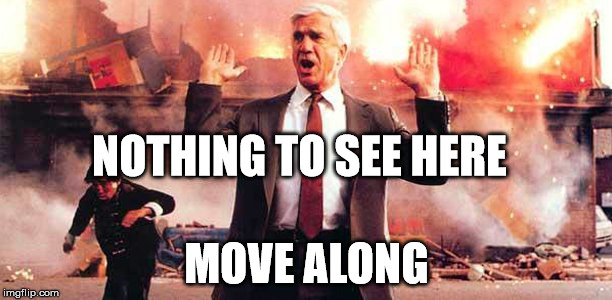
Around the same time, Nixon’s Vice President, Spiro Agnew had a corruption scandal of his own, which prompted him to resign on October 10th, 1973. 10 days later, on October 20th, 1973 (the so-called “Saturday Night Massacre”), Nixon attempted to fire the special prosecutor (Archibald Cox), first ordering his Attorney General, Elliot Richardson, to do it. Richardson immediately refused and turned in his resignation. Deputy Attorney General William Ruckelshaus did the same. Nixon finally got Robert Bork to do his bidding. 11 days later, Congress appointed a new Special Counsel to investigate the President’s actions and ruled that what he’d done wasn’t exactly legal.
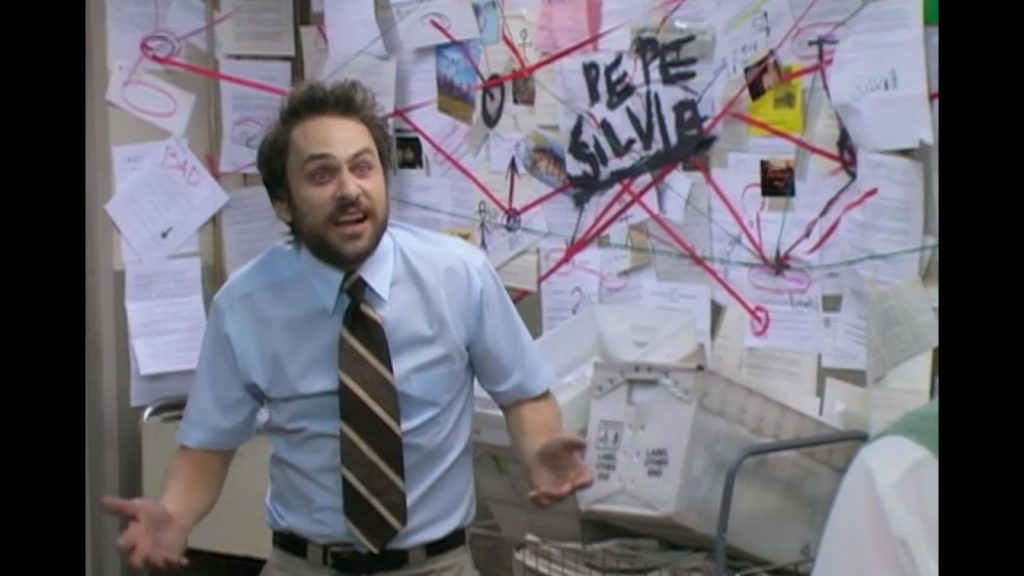
Me trying to explain Watergate ^
Finally on July 27, 1974, the House Judiciary Committee passed the first of three articles of impeachment, charging obstruction of justice. As the walls were closing in on him, Richard Nixon admitted defeat and became the first U.S. President to resign on August 9th, 1974. And here’s the really crazy part, if Nixon hadn’t interfered in the 1972 election, he still would’ve won in a landslide!
Ultimately, the Watergate scandal resulted in the indictment of 69 people, resulting in 48 found guilty, including several top Nixon officials… except for Nixon himself?! That’s because his newly appointed Vice President, Gerald Ford (the former Speaker of the House) stepped in as the 38th Potus and pardoned Richard Nixon of all wrong doing! – a move I would definitely consider one of the most epic fails of all time…
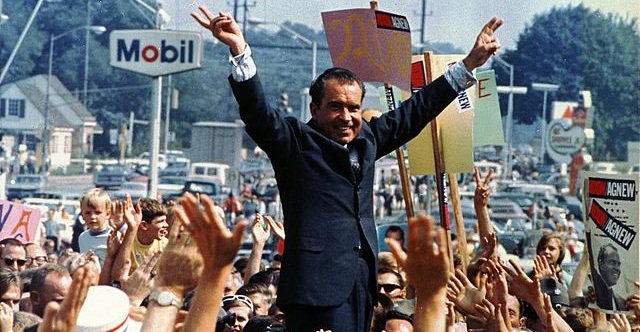
… and the rest, is history.
Erik Slader
Click here for Part 11: Ford, Carter, and Reagan!
Thanks for reading! If you’re a fan of the blog, be sure to listen to the Epik Fails of History podcast and check out my all new “EPIC FAILS” book series – available now wherever books are sold! “EPIC FAILS: Not-So-Great Presidents” hits shelves on January 15th, 2019.
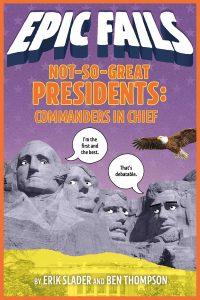 Presidential Pros and Cons – Part 1
Presidential Pros and Cons – Part 1
NUCLEAR FAILS: 10 of the Most Terrifying Atomic Mistakes in History!
7 of the Most Insane Viking Sagas of All Time!
Sources:
“How to Fight Presidents” by Daniel O’Brien
“Failure of the Presidents” by Thomas J. Craughwell
“Dark History of the American Presidents” by Michael Kerrigan
“Heroes of History” by Winston Churchill
“The World Book of America’s Presidents” by Dale W. Jacobs
“Mortal Error: the Shot that Killed JFK” by Bonar Menninger
American Presidents: Life Portraits (C-SPAN)
Mini-Biography (Bio)
https://en.wikipedia.org/wiki/List_of_Presidents_of_the_United_States
http://www.presidentsusa.net/statesunion.html
https://www.trivia-library.com/u.s.a.-the-american-presidents.html
https://www.history.com/topics/black-history/civil-rights-act
https://www.bbc.com/news/magazine-21768668
https://www.usnews.com/news/special-reports/the-worst-presidents/articles/2014/12/17/worst-presidents-richard-nixon-1969-1974

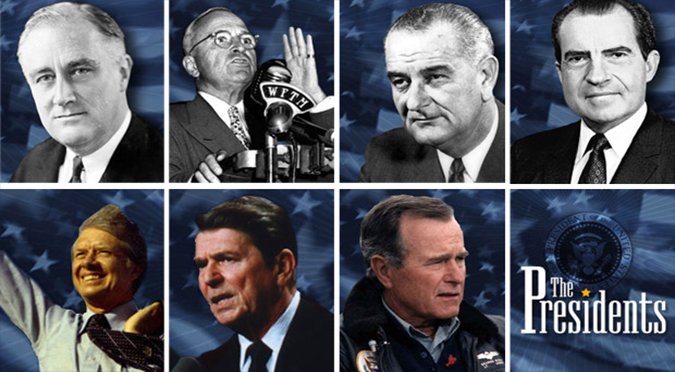

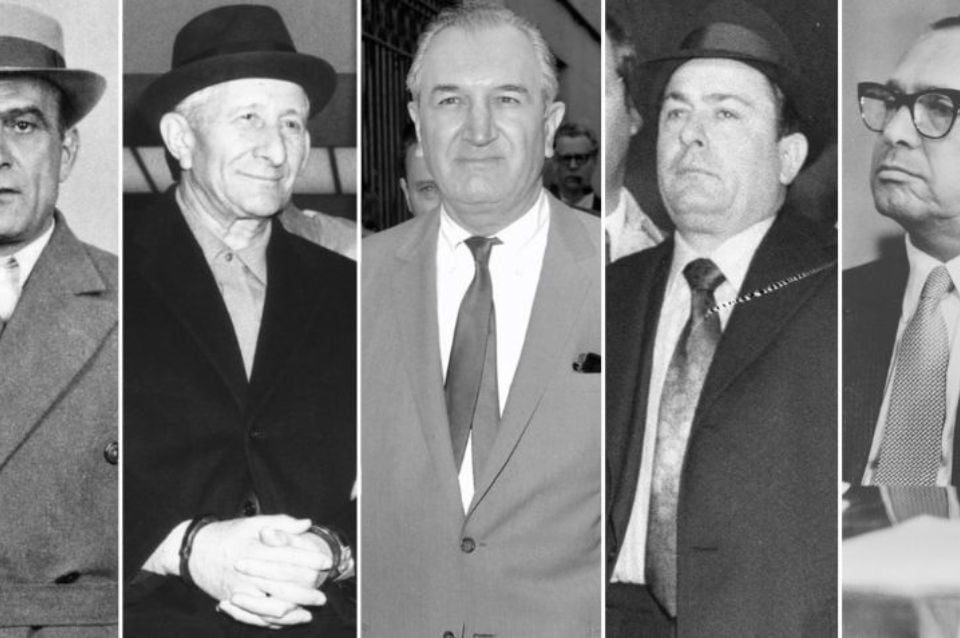
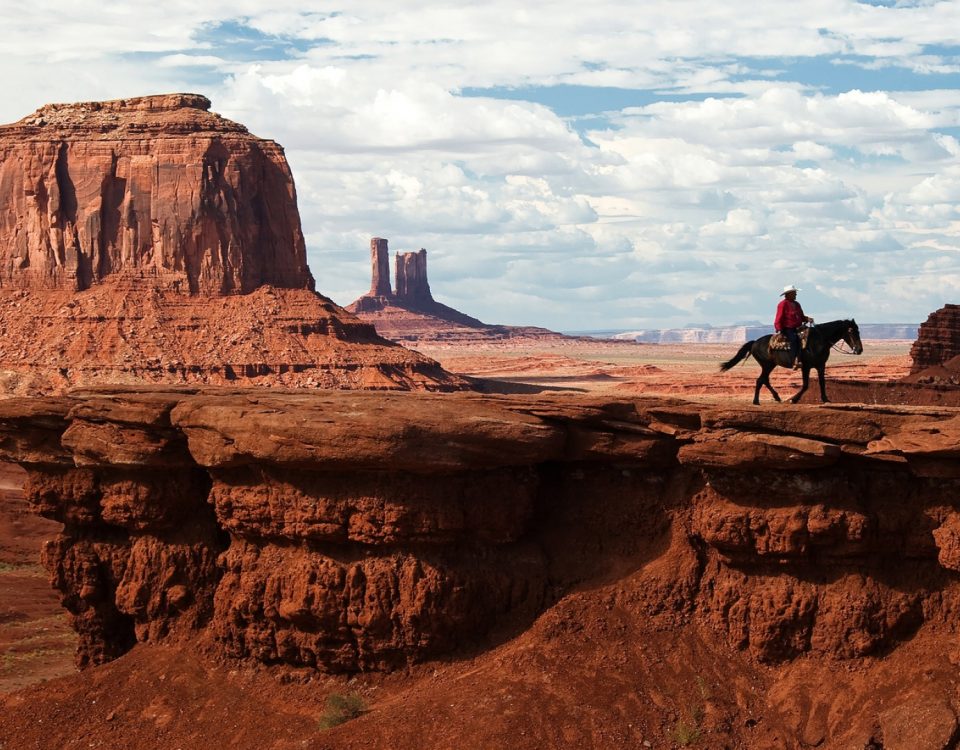
11 Comments
[…] To Be Concluded (?) in… Part 10: JFK, LBJ, and Nixon! […]
[…] 2019 – although none of them were ultimately removed from office for one reason, or another. (Richard Nixon wasn’t technically impeached, because he resigned before he could be and later avoided jail […]
Please do the next round of Presidential Pros & Cons. This is very interesting as well as entertaining.
Haha, I might have to at some point. Only problem is the next couple are going to be very research heavy and I haven’t had a lot of free time as of late. That said, I’m still putting out new episodes on the podcast! https://epikfails.podbean.com/ 🙂
Thank you so much for reading btw! I’m glad you like the blog.
Update: I finally got back to it with Part 11 and currently working on Part 12!
https://epikfails.com/2024/10/14/presidential-pros-cons-part-eleven-1974-1989/
It’s been 2 years. Please add to this. This is amazing.
Hey Kevin! I’m so sorry about the delay in responding, I feel bad that I haven’t added any new blogs to the site since this one (and even had to put the podcast on hold earlier this year – see our previous episode for more details), but the good news is that I’m just now getting back to working on new content for Epik Fails of History, including continuing this Presidents series! It still might be a minute (I’ve got a dozen spinning plates in the air), but in the meantime, you can follow me on Twitter @ErikSlader for new updates!
Dude, that would be awesome. I’m very curious to where you stand with Reagan and Carter, not to mention your dive into Bill Clinton’s potential Pros despite the Monica Lewinsky scandal.
Your pros and cons series actually reinvigorated a new niche for Presidential Facts, which prompted me to pencil down my own Ranking List for all of the Presidents. It’s saddening to realize one of the last greatest Presidents IMO was Theodore Roosevelt. I mean, the guy managed to continue his speech AFTER HE ALREADY GOT SHOT IN THE CHEST!
Update: Finally did Part 11 and working on Part 12!
https://epikfails.com/2024/10/14/presidential-pros-cons-part-eleven-1974-1989/
Update: Finally did Part 11 and working on Part 12!
https://epikfails.com/2024/10/14/presidential-pros-cons-part-eleven-1974-1989/